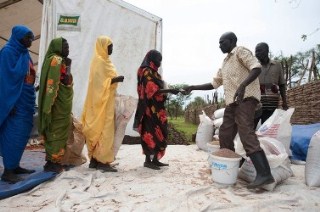UN food aid reaches Blue Nile state for the first time
April 4, 2013 (KHARTOUM) – Urgently needed food aid has reached the people of Sudan’s war-torn Blue Nile state for the first time since conflict broke out in September 2011.

Sudanese president Omer Al-Bashir had earlier barred aid agencies from providing humanitarian assistance in Blue Nile and neighbouring South Kordofan on the basis that it could be a pretext to provide food and logistical support to rebels.
WFP plans to reach some 12,000 people in Geissan and another 39,000 in Kurmuk, where people remain in dire need of food assistance.
The agency says it will need an additional $20.5 million to buy 17,000 metric tonnes of food.
“We are giving a two-month ration for this first round of distribution, following an assessment which we carried out early last month in two of the areas most severely affected by the conflict”, said WFP programme officer Arduino Mangoni from Geissan, where he is leading a team monitoring the distribution.
In a statement released on Thursday, the agency said another WFP team was currently on the ground was carrying out assessments in four other localities in Blue Nile state where it currently has access.
WFP says its assessments will help determine how people have been coping to meet their food needs, what food is available in the market and the prices at which food is sold.
Fighting in Blue Nile erupted a few months after South Kordofan when rebel fighters from the Southern-aligned Sudan People’s Liberation Movement-North (SPLM-N) launched an insurgency against the Khartoum government.
SPLM-N rebels fought alongside Southern fighters during their struggle to gain independence, but were left on the Sudanese side of the border after South Sudan seceded in July 2011.
Khartoum has repeatedly accused Juba of backing the rebels in Blue Nile and South Kordofan. An accusation denied by South Sudan, which says it has severed all ties with the group.
MAJOR BREAKTHROUGH
WFP Sudan country director Adnan Khan said the agency plans to assist all those it can reach in the state’s six localities before the onset of the rainy season in May.
“While we continue to strive for access to all areas, this is still a major breakthrough which will enable us to assist those who continue to be displaced by the conflict or those who have decided to return to their homes and are in dire need of food assistance.”
The agency has already been distributing food in limited areas inside South Kordofan after authorities gave their permission, although rebel zones in both states remain off limits.
Prior to the conflict, WFP was providing food assistance to some 183,000 vulnerable people in Blue Nile, most of them in Kurmuk, the state’s poorest locality, where there are high levels of food insecurity.
HIGH HUMAN COST
The fighting in Blue Nile has displaced tens of thousands of people, with many fleeing to South Sudan and Ethiopia to escape the violence.
The UN estimates a further one million people have been affected inside South Kordofan and Blue Nile.
Despite the high human cost, the conflict in Blue Nile and South Kordofan has largely remained out of the international spotlight due to Khartoum’s tough restrictions on media, independent monitors and aid agencies.
In January, a senior UN official spoke out against the crisis in the two states, telling reporters at the time that people there were starving to death and others were surviving on roots and leaves.
“This is 2013 and to think that tens of thousands, hundreds of thousands of people are living in such desperate and deplorable circumstances, and we can’t get in to help them as humanitarian organisations, it’s just not acceptable,” John Gin said after privately briefing the UN Security Council on the situation.
The Sudan Armed Forces (SAF) stand accused of carrying out indiscriminate aerial bombardments of populated areas in both Blue Nile and South Kordofan and has reportedly used cluster munitions. The New York-based Global Centre for the Responsibility to Protect says its troops are responsible for extra-judicial killings, arbitrary arrests, forced displacements and sexual violence against civilians during ground attacks. It says “the SPLM-N has also perpetrated war crimes, including the alleged forced recruitment of civilians living in South Sudanese refugee camps”.
The Sudanese government had long rejected negotiations with the SPLM-N but in a rare press conference last week Sudan’s first vice-president, Ali Osman Taha, said insurgents and opposition parties were welcome to join talks on a new constitution for Sudan.
Speaking at the opening session of parliament on Monday, Bashir said he was ready to engage in dialogue with opposition groups regardless of their political affiliation, including those who had taken up arms against his government.
(ST)
